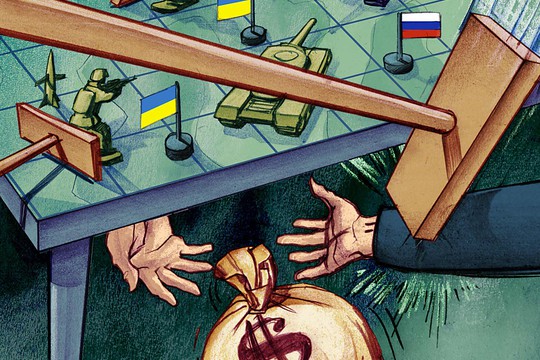Pic.: Wall Street Journal
New weapons and big-ticket items, including American-made F-16 fighter jets, have been surging into Ukraine this month, giving striking steam to the nation’s latest efforts to beat back the Russians, including a cross-border foray into Kursk.
Spending taxpayer dollars on foreign wars is a tough sell for most Americans, so ensuring accountability in Ukraine aid matters. Some experts call for more safeguards against corruption, writes ‘The Christian Science Monitor’.
That’s because corruption can threaten Ukrainian morale and success – and make U.S. lawmakers skeptical of providing more aid in the future.
U.S. officials are keenly aware, however, that it’s a tricky topic to raise. Graft seems a bit pedestrian compared with, say, Ukraine’s battle against Russia.
Corruption has long been a large problem in Ukraine – President Volodymyr Zelenskyy’s election campaign railed against it – and it would be unwise to ignore its pervasiveness and insidious effects, analysts say.
For starters, back-burnering malfeasance, usually in the form of graft, risks repeating the kind of disastrous mistakes that the United States made in Afghanistan. The government in Kabul never gained full legitimacy among the people, due in no small part to corruption, and ultimately failed to win its war against the Taliban. This despite the two decades that U.S. troops spent training local forces as well as several hundred billion dollars’ worth of U.S. military aid.
Mr. Zelenskyy seemed to reinforce ongoing corruption concerns when he last year fired his defense minister – widely liked in the West and key to putting together an arms coalition – for failing to root it out. Earlier this year, Kyiv’s new defense minister suspended a senior official being investigated for graft while buying weapons.
Still, the U.S. must do its part, too, analysts say. It has yet to hire an independent special inspector general to track U.S. security assistance to the country, for example, despite calls to do just that. A U.S. government watchdog earlier this year found that after providing more than $42 billion in security assistance since February 2022, the Pentagon “does not have quality data to track delivery of defense articles to Ukraine.”
Such data is essential not just to avoid wasting vast sums of money or putting it in the pockets of criminals, but also for the U.S. to have clarity on what makes for effective fighting.
Today, the sheer “value of the defense articles provided [to Ukraine] and the speed with which it has been delivered has raised concerns from congressional stakeholders about efforts to monitor” it, the U.S. Government Accountability Office (GAO) warned in a report released earlier this year.
Historically, U.S. law has capped the maximum value of defense goods provided under the presidential drawdown authority at $100 million per year. For Ukraine, however, Congress increased this cap from $11 billion in 2022 to $14.5 billion in 2023. As of last September, the president had approved 47 separate drawdowns, which amount to some $24 billion, according to the GAO.
To this end, it helps to know where all of these arms are at any given time. As they make their way to Ukraine, however, the separate U.S. military services use vastly different methods of determining when weapons and supplies arrive at their destination.
Does U.S. need an independent inspector general for Ukraine? Such attention should include establishing an independent inspector general for Ukraine, says retired Col. Mark Cancian, who worked for years on Pentagon budget strategy and war funding issues.
read more in our Telegram-channel https://t.me/The_International_Affairs

 12:24 02.09.2024 •
12:24 02.09.2024 •























